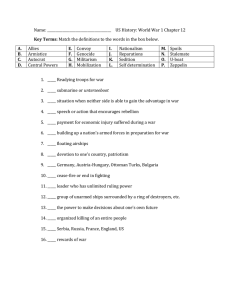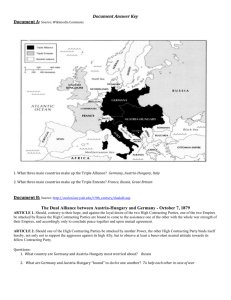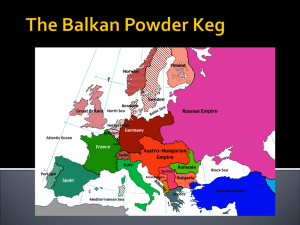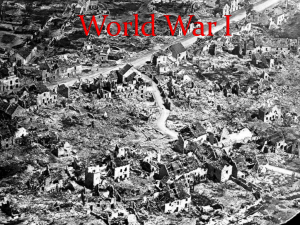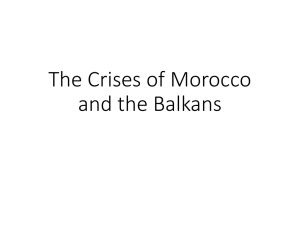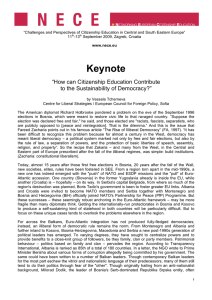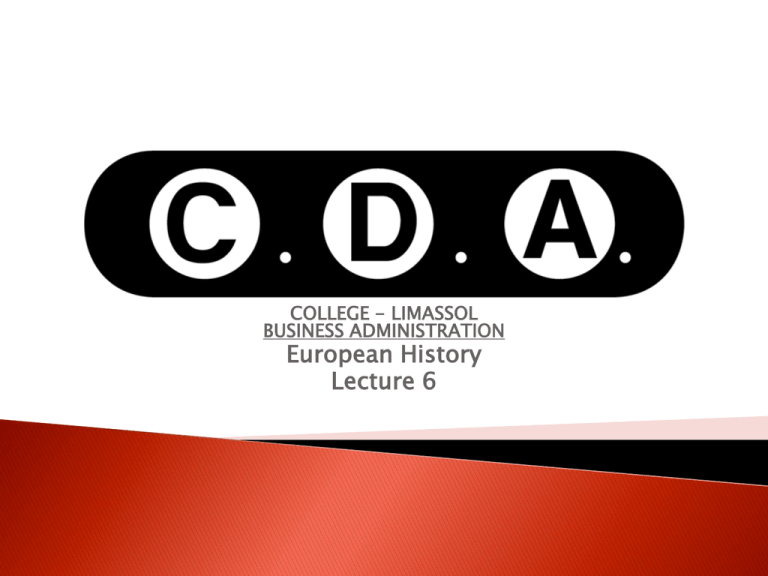
COLLEGE - LIMASSOL
BUSINESS ADMINISTRATION
European History
Lecture 6
The Russo-Turkish War.
Moroccan Crisis.
Bosnian Crisis.
The Italo-Turkish war.
The First and Second Balkan Wars.
The Sarajevo crisis.
In 1877 Russia and Serbia came to the aid
of Bosnia and Herzegovina and Bulgaria in
their revolutions against the Turkish
domination.
The Russian army attacked through
Bulgaria, and they managed to take
Adrianople in January 1878.
In March 1878 Russia concluded with the
Treaty of San Stefano with Turkey.
Romania, Serbia, and Montenegro were
freed from the Ottoman domination, Bosnia
and Herzegovina became autonomous.
Bulgaria became autonomous under
Russian protection.
Treaty of San Stefano (March 3, 1878): peace
settlement imposed on the Ottoman government
by Russia.
1. It recognized independent Bulgarian principality,
which included most of Macedonia.
2. Serbia, Montenegro, and Romania were recognized
as independent nations.
3. The boundaries of Serbia and Montenegro were
extended to make them contiguous.
4. Romania was compelled to cede southern
Bessarabia to Russia, getting in exchange the
Dobrudja from Turkey.
5. Bosnia-Hercegovina was to be autonomous.
6. Parts of Asiatic Turkey were ceded to Russia, and
the Ottoman sultan guaranteed for the security of
his Christian subjects.
The Austria-Hungary, disliked
encouragement of Slav nationalism.
The British, feared the new Bulgarian state
as a Russians’ ally.
The treaty was modified by the terms of the
Treaty of Berlin (June 13-July 13, 1878)
The San Stefano treaty was revised in order
to satisfy the interests of Great Britain and
Austria-Hungary.
1. It was denied to Russia to extend its naval
power.
2. The Ottoman Empire was allowed to occupy
Bosnia and Herzegovina.
The congress left Russia humiliated by
reducing the gains that it had made under
the San Stefano treaty.
The congress didn’t consider the
aspirations of the Balkans or any future
crises in the Balkans.
Colonian status of Morocco.
France was interested in taking over
Morocco as a colony.
In order to take permission of taking
Morocco as a protectorate, it reached
agreements with Britain and Spain.
Kaiser Wilhelm II of Germany visited
Tangier, Morocco, on March 31, 1905, and
made a speech to support the Moroccan
independence.
The French were so dissatisfied by his visit,
that many people in the French government
began to rally for war.
On January 3, 1906, France started moving troops
towards the German border. A few days later,
representatives from thirteen nations convened in
Spain, to resolve the conflict.
Only Austria-Hungary supported Germany.
The aim of the German government was to break
up the Entente Cordiale between England and
France.
Kaiser Wilhelm also wanted to humiliate France by
revealing that France could not stand up politically
or diplomatically in the face of a German challenge.
The French Foreign Minister Theophile
Delcasse was forced to resign.
Delcasse's resignation was considered as a
diplomatic triumph for the Germans.
The Algeciras Conference took place.
Things went wrong for Germans in Algecira
Conference.
Russia, France, Britain, Italy, AustriaHungary, Germany, and the United States
sent their representatives.
A test-vote took place revealing that all countries
present sympathized with France except Germany
and Austria-Hungary.
An international agreement was signed in
Algeciras: France retained control over Moroccan
political and financial affairs.
Moroccan independence was confirmed, but
France was given control over the Moroccan
financial system.
France became the ruling power in Morocco.
Germany humbled herself and gave in to the
powers of Europe.
The Bosnian Crisis was the result of the annexation
of Bosnia and Herzegovina by Austria-Hungary in
October of 1908.
The Russians wanted the control of Constantinople.
Russia’s Foreign minister Alexander Izvolsky,
made a deal with the foreign minister of Austria,
Aehrenthal.
The Russia would give Bosnia to Austria in
exchange for their silence and support in Russia’s
obtaining of Constantinople.
In addition, Bulgaria would get its independence
from Turkey, and the Austrians would give Serbia
land to keep quiet.
Unfortunately, Aehrenthal announced the
annexation of Bosnia before Izvolsky could notify
Serbia.
Serbia, was outraged and demanded Russia
intervene and support their demands for Austria to
cede Serbia part of Bosnia.
Austria, supported by German allies, demanded the
Serbs to back down.
Britain and France didn’t support Russia.
However, the annexation was not to be because
England and France blocked Austria with the threat
of war.
Political humiliation and defeat for Russia.
Known as the "Sick Man of Europe," the
Ottoman Empire was supposed to be ruler
of the Muslim and Arab-speaking North
African provinces of Tripolitania and
Cyrenacia (now both known as Libya).
Egypt was also under the Turkish rule, but it
had been occupied and controlled by the
British for decades.
As a result, the Turkish didn’t have a land
connection to their Libyan territories.
Italy was late in making colonies for the
purposes of profit, glory and power.
First, it secured the neutrality of the other
"Great Powers" of Europe.
Then, on September 28, 1911 Italy
presented to the Ottoman government an
ultimatum demanding to be allowed to
occupy Tripolitania and Cyrenacia.
The reason for demanding this, was that
Italy was trying to protect the Italian
citizens that were living there from the
alleged threats of Muslim extremists.
The Ottomans denied, but they were open
to negotiations.
After anticipating a rejection of their
demands, Italy declared war in September
29, 1911.
The Balkan Wars were some of the most
notable eruptions of ethnic nationalism and
expansionism in nineteenth-century Eastern
Europe.
It was the first concerted effort by the
Balkan people to emulate the Italian and
German examples and establish large
nationalist states.
The Great powers of Europe soon
intervened.
They helped shape the resolution and
settlement of the Balkan wars.
When lesser European states went to war
among themselves, as in the two Balkan
Wars of 1912 and 1913 the Great powers
showed their determination to work
together to keep such wars localized, in the
nineteenth-century diplomatic tradition of
the Concert of Europe.
In October 1912, Greece, Serbia,
Montenegro and Bulgaria developed an
alliance known as Balkan League and
declared a war against the Ottoman Empire.
Their aim was to free the other European
land of the Empire that they asserted.
First, Montenegro declared the war on
Turkey in Oct. 8, 1912, and the other
countries, members of the league followed.
The Balkan League proved to be victorious.
The Turkish army was defeated in Thrace by
the Bulgarians and by the Serbs in
Macedonia.
The Greeks occupied Thessaloniki and
advanced on Ioánnina.
The Balkans’ success continued when
Ioánnina fell to the Greeks and Edirne to the
Bulgarians.
A peace treaty was signed in London in May
30, 1913:
the Ottoman Empire lost almost all of its
remaining European territory, including
Macedonia and Albania.
The Albanian independence was insisted
upon by the European powers, and
Macedonia was to be divided among the
Balkan allies.
The Second Balkan War began when Serbia, Greece,
and Romania dispute with Bulgaria over the
division of their joint conquests in Macedonia.
In June 1, 1913, Serbia and Greece formed an
alliance against Bulgaria.
The Bulgarians were defeated, and a peace treaty
was signed in Aug. 10, 1913.
Under the terms of the treaty, Greece and Serbia
divided up most of Macedonia between themselves,
leaving Bulgaria with only a small part of the
territory.
Greece gained southern Macedonia and
Crete.
Serbia gained Kossovo and extended into
northern and central Macedonia.
Albania became an independent state under
a German prince.
Bulgaria, frustrated in Macedonia, looked to
Austria for support.
Assassination of the heir of the Austrian
throne Archduke Franz Ferdinard by a
young Serb activist Gavrilo Princip.
Gavrilo Princip was member of a secret
terrorist organization, called the Black
Hand.
Their aim was to unite all South Slavic
people around the kingdom of Serbia.
A war with Serbia was inevitable.
Gombrich, E., H. A little history of the world.
2nd edition, 2008.
Hall, C.,R, 2000. The Balkan wars 1912-13: Prelude to the
first World War.
Paxton, O.,R., 1997. Europe in the Twentieth Century.
Ferraro, Vincent; Bosnia Crisis; Mount Holyoke College
Prepared for the National Board for Historical Service
Trenches on the Web - Timeline 1996-2000 Mike Iavarone,
All Rights Reserved
"Bosnia Crisis" Microsoft Encarta 98 Encyclopedia 19931997: 2. Microsoft Corporation. CD-ROM. Microsoft
Corporation. 1997
http://www.google.com.cy/search?q=balkan
+wars+of+1912+13&hl=en&gbv=2&prmd=i
vns&source=lnms&tbm=isch&ei=NSNbTTwFcbL0QWyrIHqDQ&sa=X&oi=mode_link&ct
=mode&cd=2&ved=0CAYQ_AUoAQ

